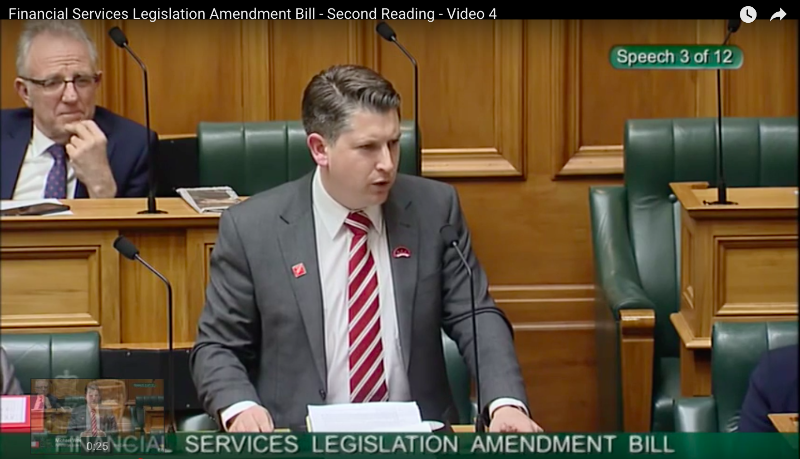
While the Financial Advisers Act suffered a wide-ranging 11th hour revamp that disrupted many advisers’ study and business planning, FSLAB looks likely to progress into law much as it is.
It passed its second reading in the house last night with unanimous support, and is set down for committee stage.
All members spoke in favour of the bill, though some seemed more familiar with it than others.
National MP Jonathan Young, chair of the Economic Development, Science and Innovation Committee, which considered the bill, said the bill created a new framework for advice.
He noted some of the issues the committee had heard from the industry, and said it was conscious that the conduct of nominated representatives should be tightly controlled by their provider.
He said it had also considered what exclusions from regulation were appropriate, particularly for lawyers and accountants.
“We recognise that normal legal and accounting advice may sometimes technically fall under the bill's definition of what financial advice is, however, we consider that lawyers and accountants should not be burdened with additional regulatory controls in the course of their ordinary business or occupation.
“Existing regulatory frameworks for the legal and accounting professions should suffice. We, therefore, consider the exclusion necessary to avoid unnecessary compliance requirements and, of course, costs, which are passed to the clients.”
Labour MP Michael Wood made reference to the Royal Commission of Inquiry in Australia.
He said it was vital that consumers in New Zealand had confidence in the financial advice they received, and that it was given in a principled way.
But huge numbers did not have access to the advice they needed.
"The second issue which I know came through in a number of the submissions was a concern around ensuring—and this is one of the objects of the bill—that we have adequate regulation at both the big end of town and the small end of town," he said.
"The bill has certainly tried to deal with that by ensuring that that applies across the board, that the duties are universal to people who are providing advice, but I think, again, that's something that we'll be needing to keep an eye on.
"It's very much my view that this is a good piece of legislation that brings our regulations up-to-date, that deals with a number of the concerns that the Ministry of Business, Innovation and Employment and others in the sector have raised, but it's probably not the final word on the matter. As the sector continues to grow, as our understanding of the issues changes, as technology, it's likely that this house will return to some of these issues in future years as well."
Former Commerce Minister Paul Goldsmith said Wood would have opposed the bill, had he brought it into the house in the last parliamentary term.
Goldsmith said concern about the safety of the sharemarket drove New Zealanders into property investment, and there was a big problem around conflicted advice.
“If somebody is coming along and offering me a financial product, it is highly relevant to know whether or not—if they're suggesting to you to invest in product A rather product B, we should expect to be able to know whether they're getting a commission on product A and not on product B. That is a fundamental piece of transparency that is required in the provision of advice. So that is the purpose of requiring some transparency around what an adviser is able to do," he said.
"There have been long debates through the course of the select committee about how far to push that. Obviously if somebody is working within a particular firm that offers a bunch of financial services, where we got to is you can't expect an adviser within that firm to offer everything in the whole market that is available, but you can expect them to say to make it absolutely clear when they're giving that advice, 'Well, these are the products that I'm selling, but there is a whole lot of other stuff that you could look at if you're not—but I'm not pretending that the products that I'm offering are the only ones, and, obviously, I have a commission that is related to those products.'
"But just getting transparency into that process has been a critical part of this."
He said if advisers had been "chopping and changing" clients through products to get commission, regardless of whether that was beneficial to the client, that was not something that should be supported.
"Now you might argue that that's something for individuals to deal with, but the whole point of financial services is it is a very complex area and that is why we have chosen to regulate in this area."
National MP Brett Hudson said he had been told by the industry that it was important the bill did not turn off legitimate opportunities for New Zealand businesses.
"We have the ability to offer high-quality, high-integrity financial services as an export to the rest of the world, and we shouldn't have legislation in place that prevents it."



